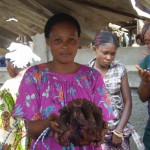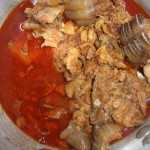Español (pdf) Français (pdf) Deutsch (pdf)
(Vienna, 15 February 2010) – Contemporary African societies are a mix of modernized, western society and traditional African roots. Those traditions mean that people – rural and urban – still consume bushmeat for reasons linked to culture, taste and attachment to healthy, natural products.
However, the scale of hunting occurring in Central Africa poses a threat to many tropical forest species. The response to this has typically been legal: ban the trade in bushmeat and criminalize the hunters and consumers.
This, said Nathalie Van Vliet, Bushmeat strategic advisor for TRAFFIC, has not been terribly effective. The trade continues to flourish but in a hidden economy that makes it more difficult to manage or control.
Those in the bushmeat trade who make money out of the commercialisation of rare species for the urban markets need to be strictly controlled. However, those who eat bushmeat for their own nutrition or sell bushmeat to pay for medicines or school fees, should not be presented as criminals,” she says.
Dr. Van Vliet will coordinate a session dealing with the hunting of bushmeat in Central Africa at the 2010 IUFRO World Congress in Seoul.
She hopes her session will reach beyond conservationists to also integrate the input of social, health and economic stakeholders to help develop more integrated bushmeat strategies and policies.
- Photo taken by Casimir Nebesse (2009)
- Photo taken by Kisangani Casimir Nebesse (2009)
- Photo taken by Nathalie van Vliet (2009)
- Photo taken by Nathalie van Vliet (2008)





Posted by Valentine Scace on
Great information 🙂
Posted by casimir nebesse on
Dear all;
i am very happy to see my contribution on bushmeat trade in Kisangani.
I am for evry body
Posted by Nathalie van Vliet on
The economic cost of raising wild animals is above the costs of hunting in many places in Central Africa. What incentives could people have to switch from hunting to domesticating?
Posted by Dr A Löwstedt on
Shouldn’t the killing of our closest relatives, the anthropoid apes, who are also often sold and eaten as bushmeat, be criminalized regardless of reasons?
Posted by Nathalie van Vliet on
Great apes represent often less than 0,5 % of the total biomass hunted in Central Africa, therefore baning all bushmeat trade with the aim to protect great apes is probably not necessary. What we need to do is to distinguish the trade of resilient and common species, with the trade of endangered or protected species and find different management solutions to target different problems.
Posted by Dr. E. M. Isikhuemen on
Most wild animals eaten as bushmeat can be domesticated. Grass cutter (Cane rats), Antelope (DuiKers) , etc. are already being reared in West Africa, particularly in Benin Republic and Nigeria.It can be done anywhere in the tropical region.